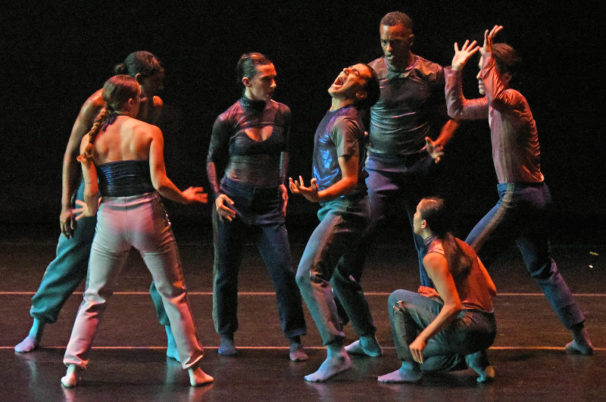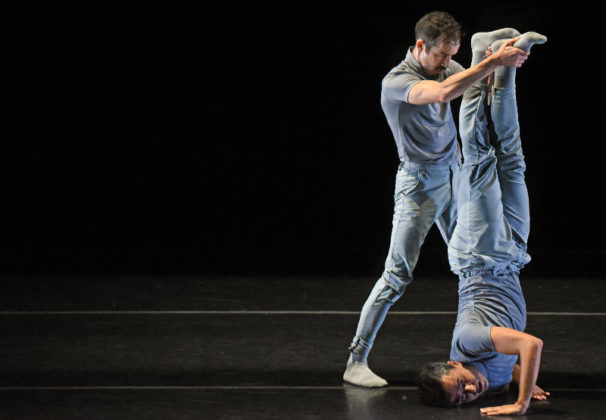
Some dance performances give us gorgeous bodies, abstract movement and music we can hum: an escape from politics, madness and murder. Others use dancers for polemics and not much else; these may be worthy, but hard to watch.
On Friday, BODYTRAFFIC, Company-in-Residence at Wallis Annenberg Center for the Performing Arts, found the middle ground in a mixed bill of four works, three of them new to LA audiences. All eight dancers, including Artistic Director Tina Finkelman Berkett and Artistic Associate Guzmán Rosado, are technically strong, well trained and for the most part work beautifully together.
The evening opened with (d)elusive minds, a theatrical showpiece based on the true story of a mental patient who killed his wife, but during imprisonment wrote to her daily, convinced she was still alive. In its first American outing, (d)elusive minds (2014) was choreographed by Fernando Hernando Magadan, a creative descendant of Nederlands Dans Theatre. A series of dramatic vignettes were interspersed with corny, Hollywood-style poses – “We are such a happy couple!” – while the narration said otherwise, and Schubert’s trio for piano, violin and cello sounded unexpectedly raw.
Finkelman Berkett, in fine form all evening, was a searing presence as the wife, with her forceful and gestural, percussive solos. Guzmán Rosado played the mental patient/murderer. He is so slender he looked out of place later in the program next to the company’s more muscular (younger?) men; but here he was perfect — all wily lightness, creepy subterfuge and a deranged, post-murder grin. Both dancers were in control, technically and thematically. A great addition to BODYTRAFFIC’s repertory.

Micaela Taylor’s Snap is a new work for eight dancers. (Now an LA-based independent choreographer, Taylor danced briefly with BODYTRAFFIC in the past.) It’s set to soul-man James Brown doing his James Brown thing on “I Got The Feelin’,” “Super Bad” and “It’s A Man’s Man’s, Man’s World.” Taylor’s driving, women-rule, don’t mess-with-me scenario wraps hip-hop into a contemporary aesthetic. Costumes were sleek, lighting was urban-nighttime glow. The company—again including Finkelman Berkett—was fired up and Taylor herself, opening the work center stage, made her street-meets-stage vocabulary explode with energy. Strong, confrontational vocalizations for two dancers amped the energy even more. Snap could do with editing—some of the man-woman confrontations seemed overworked, trite even—but it’s a crowd-pleaser that’s hard to resist.

The third new-to-LA work was Resolve, a duet for two men choreographed by the Wewolf dance collective. Rosado and Joseph Davis did what they could with the inventive arm gestures and linkages, but the choreographically limp piece went nowhere and was sadly forgettable.
Who knew Peggy Lee was a political progressive? She is now, at least in Matthew Neenan’s 2017 A Million Voices. Lee’s rendition of “Freedom Train,” a 1940s propaganda song championing the American dream, was one of four featured Lee songs. After a week of Constitution-rattling political news – impeachment anyone? – you could taste the irony. That goes for Lee’s “Is That All There Is?” as well. Rich in irony, the song opens with Lee talking in that lazy way of hers about being scooped up by her father as he races from their burning house, watching “the whole world go up in flames.” Sound familiar? Paradise, we’re with you.
BODYTRAFFIC, now 12 years old, is technically strong, creatively mature and on a par with more established ensembles. And it’s great to see two women in charge of a company this good. (Lillian Barbeito shares the artistic director role with Berkett). Friday’s program was squarely California-progressive with a dash of Hollywood but the company’s rep goes deeper and is varied in tone and style. Los Angeles can be proud.
Read Gillian Renault’s review of Jacob Jonas dance at the Wallis.
Gillian Renault has written about dance for the Los Angeles Daily News, Los Angeles Herald Examiner and artsATL in Atlanta.
